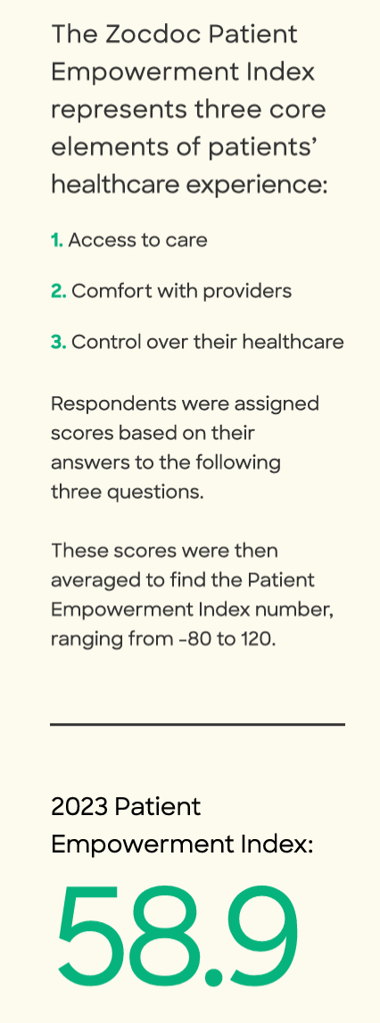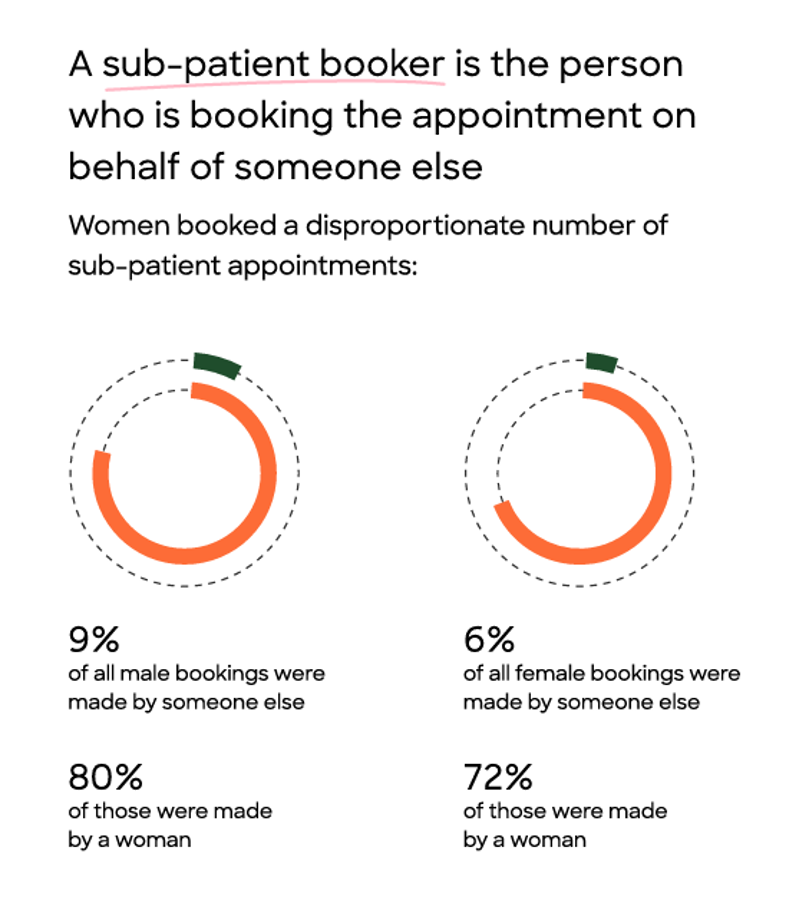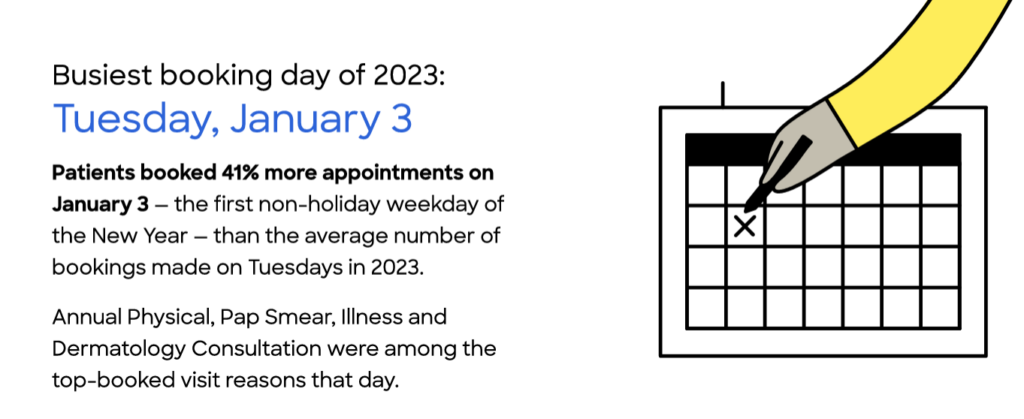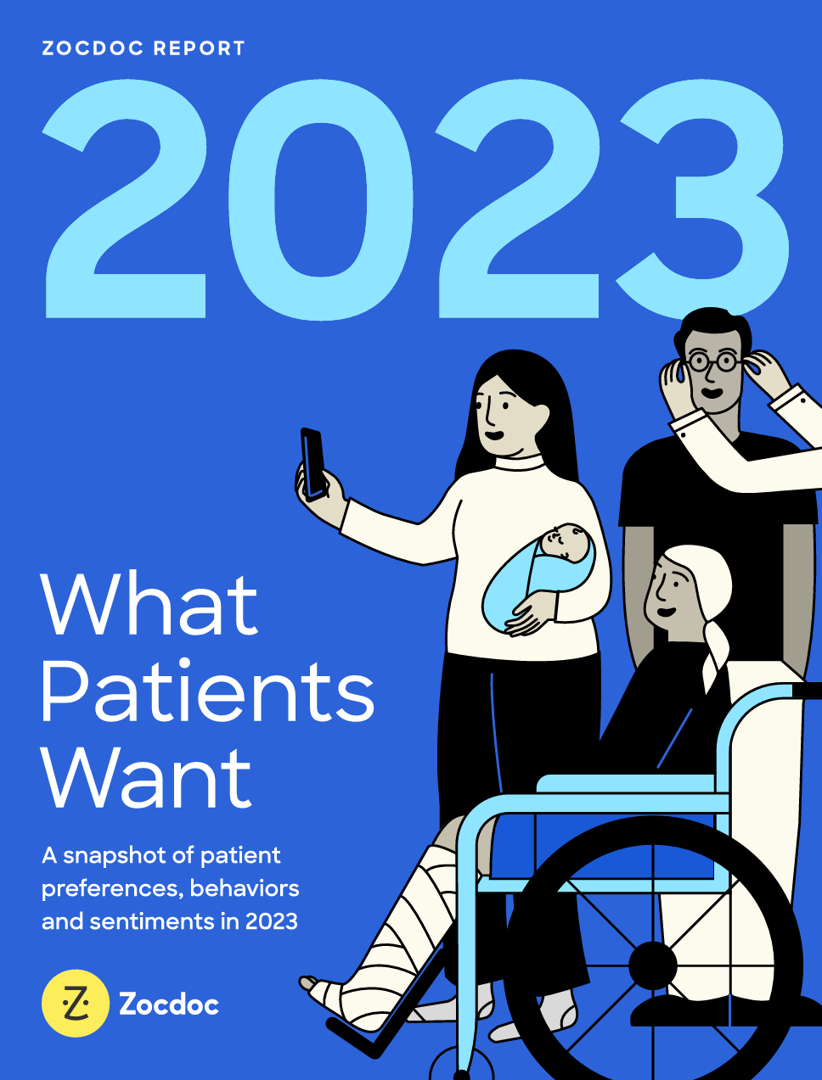The ability to book an doctor’s appointment ASAP, care available in-person and via telehealth, and control over my care — these are key factors Zocdoc explains in the company’s What Patients Want report published this week.
Zocdoc learned the top reasons consumers booked medical appointments were for primary care, such as getting an annual physical or women’s preventive care services (e.g., pap smear, gyn exam), dermatology, and mental health issues.
The top specialists booked were, consequently, primary care doctors, dermatologists, OB-GYNs, psychiatrists and psychologists, and dentists and vision providers.
In this first research study Zocdoc has conducted on patients’ perspectives on health care, the company commissioned an online survey of 1,000 U.S. consumers 18 and over in November 2023.
Zocdoc was founded in 2007 “with a mission to give power to the patient,” the company mantra goes. So this inaugural report into what patients want developed a Patient Empowerment Index to provide a baseline measure composed of 3 components of peoples’ healthcare experience:
- Access to care
- Comfort with providers
- Control over their healthcare.
The 2023 overall Index netted out at 58.9. Not so empowering, and no surprise there.
Underneath that “meh-grade” 58.9 statistic were several important findings:
- 1 in 5 people said they have little to no control over their health care
- 15% of people noted it was difficult to access care — more female than male
- More women are less comfortable with their providers than men.

The Zocdoc study revealed other important distinctions on the Mars v. Venus front, those differences between male and female patients that have typically illustrated women as the Chief Health Officers of their households.
In Zocdoc’s core business of enabling medical appointment-booking, we find that women are much more likely to be the sub-patient booker in Zocdoc-language — that is, the person booking the medical appointment on behalf of someone else.
Of the 9% of male bookings made by someone else, 80% were done so by a woman.
Women’s health also figures into the report in that after booking an appointment for an annual physical, the second-most common visit reasons booked in 2023 was for an annual pap smear/gynecological exam.
Zocdoc also looked at the top 10 visit reasons disproportionately booked by women and by men.
For women, these were infertility consults, Botox treatments, urinary tract infection treatment, eating disorders, thyroid issues, obesity and weight loss + Ozempic/Wegovy consultation (a new-new thing for 2023), hyperpigmentation, and weight management.
[A news-breaking sidebar – note Weight Watchers’ announcement this week of the launch of a telehealth program featuring Ozempic and the GLP-1 medicines — with the big “W” leaning into the fast-growing phenomenon of prescription drugs for diabetes and weight loss/obesity].
For men, the top bookings over-indexed for gout, genital warts, hernia, sleep apnea, anger management, sports injury, orthopedics (arms and elbows, shoulders), addiction and substance abuse, and hand injury.

We can also see the growing demand for omnichannel health care in this study. That medical providers (excluding mental health clinicians) who offered both virtual care and in-patient visits garnered 51% more bookings than clinicians offering in-person visits only demonstrates consumers’ interest in receiving care via different “front doors.” To that point, mobile users booking appointments booked 20% more than desktop computer users.

Health Populi’s Hot Points: Looking into the New Year, Zocdoc also learned that the busiest day of the year to schedule appointments in their system was January 3, when patients booked 41% more appointments than the average number made on any Tuesday in 2023.
The CEO of Zocdoc, Dr. Oliver Kharraz, offered some predictions for 2024 based on what the company has learned this year….
- Mental health bookings are expected to grow in the latter half of 2024 tied to the U.S. elections (check out the phenomenon of political-social stress that the American Psychological Association has been tracking)
- “Patients will choose convenience over tradition for more transactional care needs” — begging the question about the future of a primary care medical home vis-a-vis convenience and “transactional needs”
- The implementation of AI is forecasted to liberate some clinicians’ time to “rededicate’ to caring for patients
- Big Tech will continue to underperform – in the words of Dr. Kharraz, “make more noise than impact”
- As we see growing omnichannel platforms served up to patients, Dr. K expects that consumers’ digital front door to care will consolidate, and,
- Patients will become savvier prescription drug shoppers with the topic of prescription drug pricing a key health reform issue continuing toward the 2024 elections.
Entering 2024, we should be mindful that patients have been morphing into consumers, facing greater out-of-pocket costs and growing demand for omnichannel living and convenience, voting with their feet and clicks for, say, online appointments and access to health care which Zocdoc has pioneered for 16+ years. Consumers as health citizens will also vote at the polls on many of these issues, from the overall pinch of inflation and costs of living to the more micro-economic costs of health care, prescription drugs, and most especially access to women’s health care. Zocdoc’s study provides important insights helping us connect dots on the complex patient as consumer.





 Interviewed live on BNN Bloomberg (Canada) on the market for GLP-1 drugs for weight loss and their impact on both the health care system and consumer goods and services -- notably, food, nutrition, retail health, gyms, and other sectors.
Interviewed live on BNN Bloomberg (Canada) on the market for GLP-1 drugs for weight loss and their impact on both the health care system and consumer goods and services -- notably, food, nutrition, retail health, gyms, and other sectors. Thank you, Feedspot, for
Thank you, Feedspot, for  As you may know, I have been splitting work- and living-time between the U.S. and the E.U., most recently living in and working from Brussels. In the month of September 2024, I'll be splitting time between London and other parts of the U.K., and Italy where I'll be working with clients on consumer health, self-care and home care focused on food-as-medicine, digital health, business and scenario planning for the future...
As you may know, I have been splitting work- and living-time between the U.S. and the E.U., most recently living in and working from Brussels. In the month of September 2024, I'll be splitting time between London and other parts of the U.K., and Italy where I'll be working with clients on consumer health, self-care and home care focused on food-as-medicine, digital health, business and scenario planning for the future...